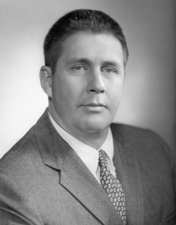Ben Smith | |
|---|---|
 | |
| United States Senator from Massachusetts | |
| In office December 27, 1960 – November 6, 1962 | |
| Appointed by | Foster Furcolo |
| Preceded by | John F. Kennedy |
| Succeeded by | Ted Kennedy |
| Mayor of Gloucester | |
| In office 1954–1955 | |
| Preceded by | Joseph Grillo |
| Succeeded by | Beatrice Corliss |
| Personal details | |
| Born | Benjamin Atwood Smith II March 26, 1916 Gloucester, Massachusetts, U.S. |
| Died | September 26, 1991 (aged 75) Gloucester, Massachusetts, U.S. |
| Political party | Democratic |
| Children | 5, including Ben |
| Education | Harvard University (BA) |
| Military service | |
| Allegiance | |
| Branch/service | |
| Years of service | 1941–1945 |
| Rank | Commander |
| Battles/wars | World War II |
| Awards | Asiatic-Pacific Campaign Medal World War II Victory Medal |
Benjamin Atwood Smith II (March 26, 1916 – September 26, 1991) was an American politician who served as a member of the United States Senate from December 1960 until November 1962.
Early life and education
[edit]Smith, who was named for his grandfather Benjamin A. Smith, was born in Gloucester, Massachusetts, to R. Russell Smith and Grace Smith. He married Barbara M. (née Mechem) of Lake Forest, Illinois, and Annisquam, Massachusetts. They had five children, sons R. Russell Smith II and Benjamin A. Smith III, an ice hockey player and coach, and daughters Barbara (Smith) Ramsey, Susan (Smith) Crotty, and Cathleen Smith.
Smith attended the Gloucester public schools. Smith was captain of the 1933 Gloucester High School football team.[1] He later graduated from Governor Dummer Academy and Harvard University. While at Harvard, Smith played fullback on the football team under coach Dick Harlow. At Harvard, Smith was a roommate of John F. Kennedy.
Military service
[edit]Smith served in the United States Navy for four years during World War II. While he was in the Navy, Smith served in the Pacific as Commander on an anti-submarine, anti-torpedo vessel.[2]
Career
[edit]Smith served as a member of the Gloucester School Committee, the Gloucester City Council and was a trustee of the Addison Gilbert Hospital. Smith served as Mayor of Gloucester from 1954 to 1955; however, at the time Smith was mayor, Gloucester was adhered to a Plan E form of government. The office of mayor was a ceremonial position, the mayor was a city councilor chosen by the city council. The city administration was carried out by a professional city manager.
For many years Smith was the chief executive of his family's business, the Merchants Box Company in Gloucester.
Senate appointment
[edit]
After being elected President of the United States, John F. Kennedy resigned his seat in the United States Senate on December 22, 1960. Kennedy, who had been reelected to a second Senate term of six years in 1958, advised then-Governor Foster Furcolo to appoint Smith to fill the vacated seat "in the interest of promoting party unity." Critics said Smith, a close friend of the Kennedy family, was intended to be a "seat-warmer" until the President-elect's brother Ted Kennedy turned thirty (the minimum age provided by the U.S. Constitution for eligibility to serve in the Senate). Indeed, Smith served as Senator until November 6, 1962, when Edward Kennedy won the special election.
Special ambassador
[edit]In 1963, President Kennedy named Smith as the chairman of the U.S. delegation to the North Pacific Fisheries Conference involving the United States, the Soviet Union, Canada and Japan.[3][4]
Death and burial
[edit]Smith died after a long illness in the Addison Gilbert Hospital in Gloucester, Massachusetts, and was buried in the Calvary Cemetery in Gloucester.
References
[edit]- ^ "Benjamin Atwood Smith 2d, at 75; former senator, Kennedys' adviser". The Boston Globe. September 27, 1991. p. 23.
- ^ "Benjamin A. Smith II, adviser to Kennedys, 75". The Boston Herald. September 28, 1991. p. 35.
- ^ "The Presidency: Amid Affairs of State". Time. May 17, 1963. Archived from the original on December 22, 2008. Retrieved January 23, 2010.
- ^ "Deaths; Benjamin A. Smith II". The Washington Post. September 28, 1991. p. B4.
External links
[edit]- United States Congress. "Benjamin A. Smith II (id: S000517)". Biographical Directory of the United States Congress. Retrieved on 2008-01-23
- "Benjamin A. Smith II". Find a Grave. Retrieved January 23, 2008.
